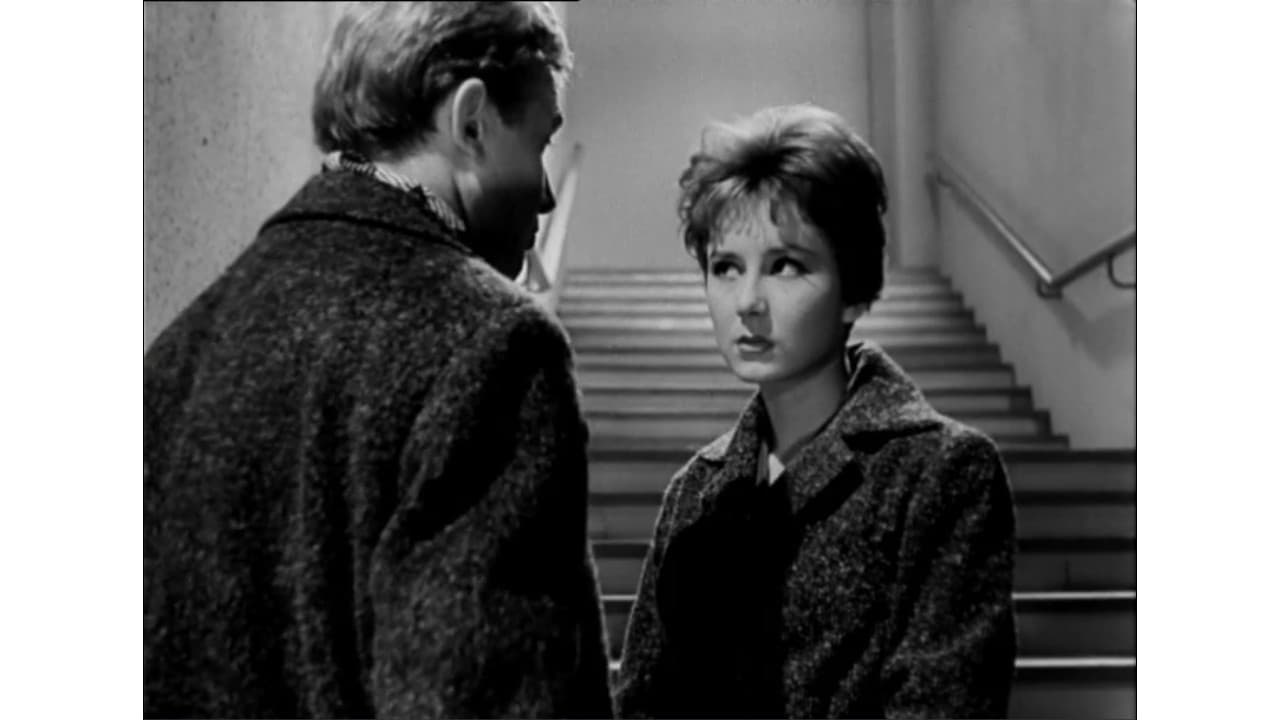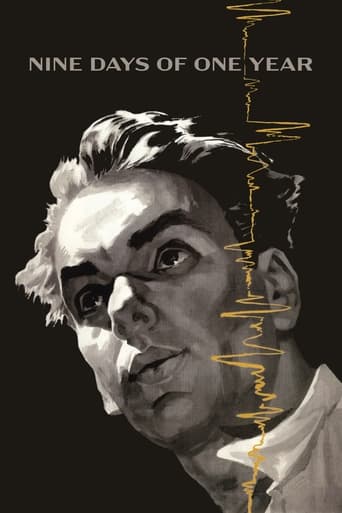Linbeymusol
Wonderful character development!
Laikals
The greatest movie ever made..!
ChanFamous
I wanted to like it more than I actually did... But much of the humor totally escaped me and I walked out only mildly impressed.
Celia
A great movie, one of the best of this year. There was a bit of confusion at one point in the plot, but nothing serious.
Antonius Block
A fantastic film with elements of the existential ponderings of Bergman, new wave filmmaking ala Chabrol or Godard, and the Soviet science fiction of the Strugatsky brothers, 'Nine Days of One Year' tells the story of a Soviet physicist risking his life to make breakthroughs in thermonuclear energy. The scientist, Dmitri (or Mitya, played by Aleksey Batalov), is also in a love triangle with his friend and colleague Ilya (Innokenty Smoktunovsky) for the affections of another scientist, Lyoyla (Tatyana Lavrova).Director Mikhail Romm pulls all the right strings as he creates beautiful scenes and evokes emotion. The massive machinery of the reactor, the experiments, and the personalities involved all feel very real, and those with a background in science may especially like this film. Hey, this is a movie where, at a wedding, nuclear physics and space travel are discussed! But that scene has such a light and organic feel to it, with the colleagues interrupting one another during their toasts (as well as performing a few calculations on napkins), that despite what sounds like dry subject matter, it's wonderful. Smoktunovsky turns in a great performance as Ilya, who makes philosophical and often cynical comments on humanity and its use of technology. "Mankind has reached such perfection that it can eliminate all life on Earth in 20 minutes," he says early on. And yet the film has an optimism to it as well. When one scientist points out how impossible travel to the edge of the galaxy would be, another says that "when Tsiolkovsky developed his rocket equation sitting in the restaurant Yar, scientific skeptics like you, doodling on their napkins, concluded that he was crazy. Yet today we fly in space." Konstantin Tsiolkovsky was a real scientist, and developed his equation in 1897, and the film does have a certain pride in Russian/Soviet technology, rightfully so.Tatyana Lavrova is also strong as Lyolya, at first whimsical as she tries to figure out which of the two she should marry, and then melancholy as she finds herself neglected. She is a nuclear physicist herself, and it's sad when she begins to doubt herself as a wife and scientist. As Mitya sacrifices his health by being exposed to harmful levels of radiation, she sacrifices her happiness in supporting him through his frustrations when the experiments aren't successful. The inner dialogue Romm employs with her is great, particularly in a scene when Ilya is expounding on makind, which I've excerpted below. Batalov plays the grim and determined Mitya well, and the scene when he visits his family and talks to his elderly father is especially poignant. The film was made in 1962 at the height of the Cold War (with the US and USSR feverishly developing massive atomic bombs and about to head into the Cuban Missile Crisis, among other things), but it only has a few glimpses of nationalism. In one, the Western uses of science to advance warfare in horrific ways are alluded to, and contrasted with Mitya's desire to create a thermonuclear reaction to produce energy, which will help "advance communism". In another, Mitya tells his father that the Soviets needed to have developed the bomb or they would have been eliminated along with half the people on earth, presumably because of the Americans. However, the film also has one of the Soviet scientists saying that modern warfare promotes science, that the two are inseparable, and there is also a reference to Stalin's purges, as Ilya says he would have known to hold his tongue to avoid appearing "ideologically unreliable." That's a remarkable reference, considering how touchy the subject was. Just a few years earlier, Vasily Grossman's epic novel 'Life and Fate' (which also features a nuclear physicist as a protagonist), was seized by the KGB, and despite some softening under Khruschev, citizens and artists still had to be very careful. I've rambled probably a bit too much here, and will summarize. Don't be afraid of the physics! Or that this sounds like a dark film from behind the Iron Curtain. It's beautiful, philosophical, and uplifting, and it's also a fascinating window into the USSR in 1962. Quotes:
On technology and warfare.
Ilya: "Science advanced the knowledge of chemistry. And then the Germans invented poison gas. The internal combustion engine was developed, and the English built tanks. The chain reaction was developed, and the Americans dropped the bomb on Hiroshima. Doesn't it make you want to stop and think?"On mankind:
Ilya: "Do you really think that man has become more intelligent in the last 30,000 years? No, our brain has not grown bigger. The inventor of the wheel was as brilliant as Einstein. Whoever discovered fire was smarter than a quantum physicist. Think about the pharaoh Akhenaton. He lived 4,000 years ago. Or queen Nefertiti. What fine, intellectual, inspired faces. And now look around you. Neanderthals. Look at them. Look at them. (pointing) There. Look over there. Those are Danes there. Those are ours. Americans. Look at that Australopithecus.
Waiter: "May I help you?"
Ilya: "No, no. Nothing. (continuing to Mitya) But a pharaoh could only destroy 5,000, maybe 10,000 people. Today that is nothing - a trifle."
Lyolya (thinking): "He loves me. He still loves me. I can see it now. Mitya, look my way. He doesn't want to. Ilya looks at me."
Ilya: "And no Genghis Khan could imagine the death camps and gas chambers. He wouldn't think to fertilize fields with human ashes, fill mattresses with women's hair or make lampshades from human skin."
Mitya: "You know Ilya, I envy you. Only an optimist can afford to view the world with such pessimism. You must be doing well."On communism:
Mitya: "I'm sick and tired of your kind nature."
Ilya: "Building communism requires even kind-hearted people."On fools; this one seemed dead-on relative to the current president of the US:
Ilya: "Fools are always interesting, Mitya. Fools are, so to speak, a social phenomenon. I make a study of them. Life would be incomplete without fools. A fool reflects his times with amazing precision. The wise may be either ahead of or behind their times. This doesn't happen with the fool."
SocalSam
This is a movie that you must see if you want to see science and the process of fail-success. The tension is built up with the exposure of two scientists, one of whom marries another scientist.
The set varies between the nuclear test lab, which is likely a real life decommissioned ammunition bunker and production factory. External scenes are the usual woodsy and natural tableau seen in these Soviet propaganda films. Food is abundant, as is booze. Each night seems to be a party. People are a little more cheerful than I think the population was. The apartments that the scientists live in seems larger than what one thinks of in the Soviet Union.
Camera work is sharp, with each image having a depth of field that you don't see in US films. Acting is focused, the actor eyes all seem to be lasers looking into the depth of quantum mechanics.
During a visit to relatives, the scientist hitch a ride on a steam train with only flatcars, their feet hanging over the sides of the cars. There was no attempt to hide the primitive technology that resided in parallel with this insanely advanced technology drive.
If you are science nerd see this movie.
dminkin
Nine Days of One Year refers not to nine consecutive days but rather to the Narrator of the film cherry-picking nine important days in the lives of two nuclear scientists and the woman they both love. The movie is set during the recent thaw in the time of the Cold War and uses the same lead actor we saw in The Cranes are Flying, the great Alexey Batalov. The director, Mikhail Romm, strives to reveal a community that had been veiled during Stalin's years. Ilya, Gusev, Lyolya; three physicists connected by bonds stronger than friendship, are tasked with illuminating the mysterious world of science and technology that had (and is) often closed to the public. An amazing achievement for its subject matter, the film was both produced and set in the time of the thaw; it is a film that claims in the very beginning through its Narrator that besides scientific inaccuracies committed here and there, all other facets of this movie are as close to representing the truth as possible. One can sense immediately that the film does not merely seek satisfaction in developing and propagating a story, whatever merits contained within notwithstanding (be it setting, theme, special mechanics, character development, dialogue, screenplay); it has incorporated a narrator to expedite the process while maintaining a basic necessary structure. The film instead yields many questions about the nature of scientific discovery and the potentially deadly consequences contained within those discoveries that affect both the scientific community and mankind at large. In fact, so great is the feeling of impartiality in the presentation of these questions, an agenda so strong that the characters cease to be themselves and turn into the mouthpiece of a tangible abstraction, an unnamed character both invisible yet omnipresent. We first become aware of it when Sintsev's manic obsession with his work in the nurse's room gives way, suddenly, to a moment of complete clarity and sensitivity to Gusev, the man who had been exposed to 200 roentgens of nuclear radiation; Sintsev suggests that Gusev find a girl before it is too late. How very uncharacteristic of a man who was just earlier celebrating his scientific breakthrough and ready to keep working even though in Gusev's words "he had killed himself" due to the exposure. Other times amid the scientific banter, theories, thought experiments and the like littering the movie, comes more transcendent ideas, detailing the correlation of scientific progress with the advent of war, a conversation played out by two scientists, whose conclusion is that the interests of science are aligned with those of war. Ilya and Gusev may be two more vessels for this omnipresent guiding voice while Lyolya seems to be purposefully granted immunity; for she is granted her own private thoughts, and is the one character who doubts herself as a scientist and instead thinks first of herself as a wife. Ilya questions the ultimate implications of scientific discovery and asks, "What good does it do?" Gusev, however, the character most immersed in the scientific realm and obsessed by his work, perhaps offers the greatest and strangest consolidation of the essence of the film. In a letter closing out the film, written to Ilya and Lyolya, he draws a picture of the three holding hands and asks to grab a bite to eat at a local café. The scene is a breathtaking exposition that humanity is more important than progress, which of course can be read as a refutation of the communist ideal.
vr0791
I am Russian, I am a scientist, and, probably, that's why I like it. This film together with the book by brothers Strugatsky "Monday begins on Saturday" forms a manifestation of the Russian science spirit, as it was in good old Soviet era days. May be, the very special atmosphere of leading Soviet research institutes, the atmosphere of creativity and self-sacrifice, is one of a few positive contributions that communists have brought to the Russian culture. At least, the film of Mikhail Romm brings us to the wonderland, where people believe in what they do. Romm tells us a sad and beautiful story about an island of freedom, the island which is nowadays lost under the waters of "real life".

